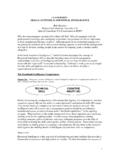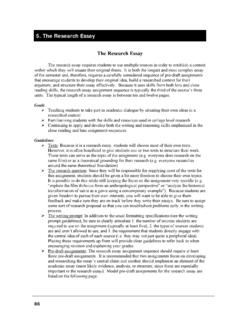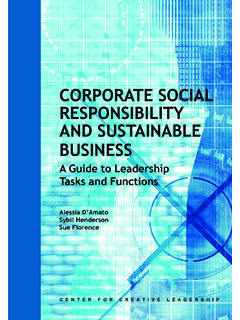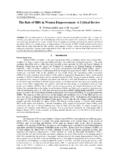Transcription of Republic of South Africa - SAFLII
1 Republic of South Africa IN THE HIGH COURT OF South Africa (WESTERN CAPE DIVISION, CAPE TOWN) Case number: 20228/14 Before: The Hon. Mr Justice Binns-Ward In the matter between: XTRAPROPS 66 (PTY) LTD Applicant And PHIOPATER SUPPLIES (PTY) LTD Respondent JUDGMENT DELIVERED ON 25 NOVEMBER 2014 BINNS-WARD J: [1] The applicant has applied for the eviction of the respondent from certain business premises in Camps Bay. The respondent has been in occupation of the premises in terms of an agreement of lease with the applicant. [2] It is not in dispute that the respondent is in arrears with the rental calculated according to the tenor of the deed of lease, although the extent thereof is a matter in contention. [3] The deed of lease provides in clause that should the tenant fail to pay any amount due under the lease on due date the landlord shall be entitled to cancel the lease. Acting pursuant to that provision, the applicant gave the respondent written 2 notice of the cancellation of the lease on 4 November 2014.
2 The letter of cancellation gave the respondent notice to vacate the premises by 5:00 the same day. [4] The current proceedings were instituted on 11 November 2014 after the respondent had failed to comply with the demand that it vacate the premises. The application was set down pursuant to a notice of motion formulated in accordance with the practice described in Gallagher v Norman's Transport Lines (Pty) Ltd 1992 (3) SA 500 (W) to incorporate a truncated timetable for the exchange of papers. The respondent duly delivered its answering papers in compliance with the timetable set in the notice of motion. [5] The respondent contested the propriety of the application being entertained as a matter of urgency. There is no doubting that it remained open to the respondent to take the point notwithstanding its delivery of answering papers. There was no suggestion by the applicant s counsel, quite rightly, that the respondent had waived its right to contest urgency by delivering answering papers that went into the merits of the case.
3 On the contrary, a respondent in receipt of a notice of motion in an allegedly urgent matter, in which a reasonably formulated timetable on truncated time limits for the exchange of papers has been provided, puts itself at risk of not having its side of the case considered if the court determines that the case should be heard as one of urgency on the date on which it has been set down for hearing in terms of the timetable. [6] The applicant contends that the urgency of the matter lies in the fact of the continuing prejudice it is suffering through non-receipt of the stipulated rental on the property and that it has a replacement tenant who is able to take occupation of the premises as soon as the respondent vacates them. There is the potential, in the context of the respondent s alleged history of an inability to meet its debts, that the applicant may suffer irremediable financial prejudice if the matter were to be heard in the ordinary course, or three months hence on the semi-urgent roll.
4 In my judgment a case for some degree of commercial urgency has been made out. Having regard to the fact that the papers were complete, counsel on both sides had been briefed to be prepared to argue the matter and the demands on the fast lane court of the Third Division were relatively light at the time, I considered that it was in the interests of justice to entertain the application out of the ordinary course. As I remarked during the course of argument, this was a borderline case on urgency. While the court should 3 be careful to discourage the bringing of applications on unrealistically optimistic contentions of urgency, the distinction between what will be entertained as urgent enough to be heard in the fast lane court and what will be enlisted for hearing as semi-urgent will to some degree be determined by the exigencies of the demands on the duty judges when the matter is called.
5 Had the state of the urgents roll been more pressing at the time, the matter would have been sent for hearing on the semi-urgent roll. [7] The respondent opposed the application on the basis of an alleged agreement concluded orally between its representative and a representative of the applicant in April 2014. According to the respondent, the applicant had agreed to accommodate the respondent s difficulty in respect of meeting its rental obligations by accepting payment of 25% of the daily takings of the restaurant business conducted by the respondent in the leased premises. The respondent alleged that it had been complying with the terms of the so-called compromise agreement . The applicant disputed the respondent s allegations concerning the alleged compromise agreement. As the applicant is seeking final relief on motion, the application falls to be decided accepting the respondent s version to the extent that it is not patently untenable.
6 [8] The applicant s counsel contended, however, that the respondent was unable to rely on the orally concluded compromise agreement by reason of clause 14 of the deed of lease, which provides as follows: 14. NO VARIATIONS No variations of this agreement shall be of any force or effect unless it (sic) is in writing and is signed by both the Landlord and the Tenant. (underlining supplied) This Lease contains all the terms and conditions of the agreement between the Landlord and the Tenant. The parties agree that there are no understandings, representations or terms between the landlord and the Tenant in regard to the Letting of the Premises other than those set out herein. No indulgence, concession, act of relaxation or latitude on the part of the Landlord in regard to the carrying out of any of the Tenant s obligations in terms of this Lease shall prejudice or derogate from or be construed as a waiver of any of the Landlord s rights in terms hereof or be regarded as a novation of such rights or found an estoppel.
7 4 The applicant s counsel was relying on what is commonly called the Shrifren principle, after the judgment in SA Sentrale Ko-op Graanmaatskappy Bpk v Shifren en Andere 1964 (4) SA 760 (A). [9] In Shifren, the Appellate Division of the late Supreme Court of South Africa determined that parties who contracted on the basis of entrenching formalities, such as requirements that any consensual cancellation or variation of their agreement had to be in writing signed by the parties to be of any force or effect, bound themselves by such contracts to observe such formalities, and that any subsequent contract of a nature to which the formalities were intended to apply would be unenforceable unless compliant with the self-imposed formalities. The application of the Shifren principle in the post-constitutional era was confirmed by the Supreme Court of Appeal in Brisley v Drostky 2002 (4) SA 1 (SCA) (2002 (12) BCLR 1229; [2002] 3 All SA 363) [10] The respondent s counsel acknowledged the effect of the Shifren principle, but argued that in the circumstances of the current case it could be ameliorated to allow recognition and effect to be given to the compromise agreement.
8 In this regard counsel submitted that the conclusion of the compromise agreement had entailed the oral waiver by the applicant of its rights in terms of the rental clause. He contended that the Shifren principle did not exclude the ability of a contractant to orally waive a provision in a contract subject to a non-variation clause that was exclusively for the benefit of that party. In support of that contention he called in aid the unreported decision of the KwaZulu-Natal High Court in Buffet Investments Services (Pty) Ltd and Another v Band and Another [2009] ZAKZDHC 38 (5 May 2009). Counsel submitted that the conclusion of the compromise agreement had entailed the waiver by the applicant, pro tanto, of the benefit of the rental clause, which was a provision exclusively for its benefit. [11] The respondent s counsel also argued that, depending on the facts of a given case, public policy considerations might justify a departure from the controversial strictures of the Shifren principle.
9 For this part of his argument counsel invoked support from the judgment of Peter AJ in Steyn and Another v Karee Kloof Melkery (Pty) Ltd and Another [2011] ZAGPJHC 228 (30 November 2011), which, in turn, in the relevant part, had relied on the judgments of Alkema J (Pillay and Ndengezi JJ concurring) in Nyandeni Local Municipality v Hlazo 2010 (4) SA 261 (ECM) and Kollapen AJ in GF v SH and others 2011 (3) SA 25 (GNP). Counsel contended that 5 it would be against public policy to allow the applicant, to the grave prejudice of the respondent, to avoid the solemnly concluded compromise agreement by reliance on the Shifren principle. I understood counsel s argument in this regard to be in essence that to apply the Shifren principle in the context of the given facts would be, in effect, to favour dishonesty or business immorality in a manner that should not be countenanced by public policy. [12] A final argument advanced by the respondent s counsel about whom, it should be recorded, that while he acknowledged, realistically, that his client was in a difficult spot, said everything that could be advanced in favour of his client in the circumstances was that the compromise agreement established a regime of substituted performance in respect of the rental obligation in terms of the deed of lease.
10 Referring to Van der Walt v Minnaar 1954 (3) SA 932 (O) and Telcordia Technologies Inc v Telkom SA Ltd 2007 (3) SA 266 (SCA) (cited at para 34 of the judgment in Steyn and Another supra), he submitted that it had been held that an agreement to accept substituted performance was not a variation of the original agreement. [13] For the reasons that follow I am of view that there is no merit in any of bases suggested by the respondent s counsel upon which the respondent could avoid the effect of the Shifren principle to rely on the compromise agreement. I also find that there is nothing to be had in the substituted performance related defence. [14] An agreement that the rental be determined and paid by way of 25% of the respondent s business s daily takings would amount to a variation of the agreement as to the determination and payment of the rental entrenched in the deed of lease. The subject of any such agreement would therefore fall four square within the ambit of clause of the deed lease and thus, on the Shifren principle, be enforceable only if it complied with the entrenched formalities, viz.
















